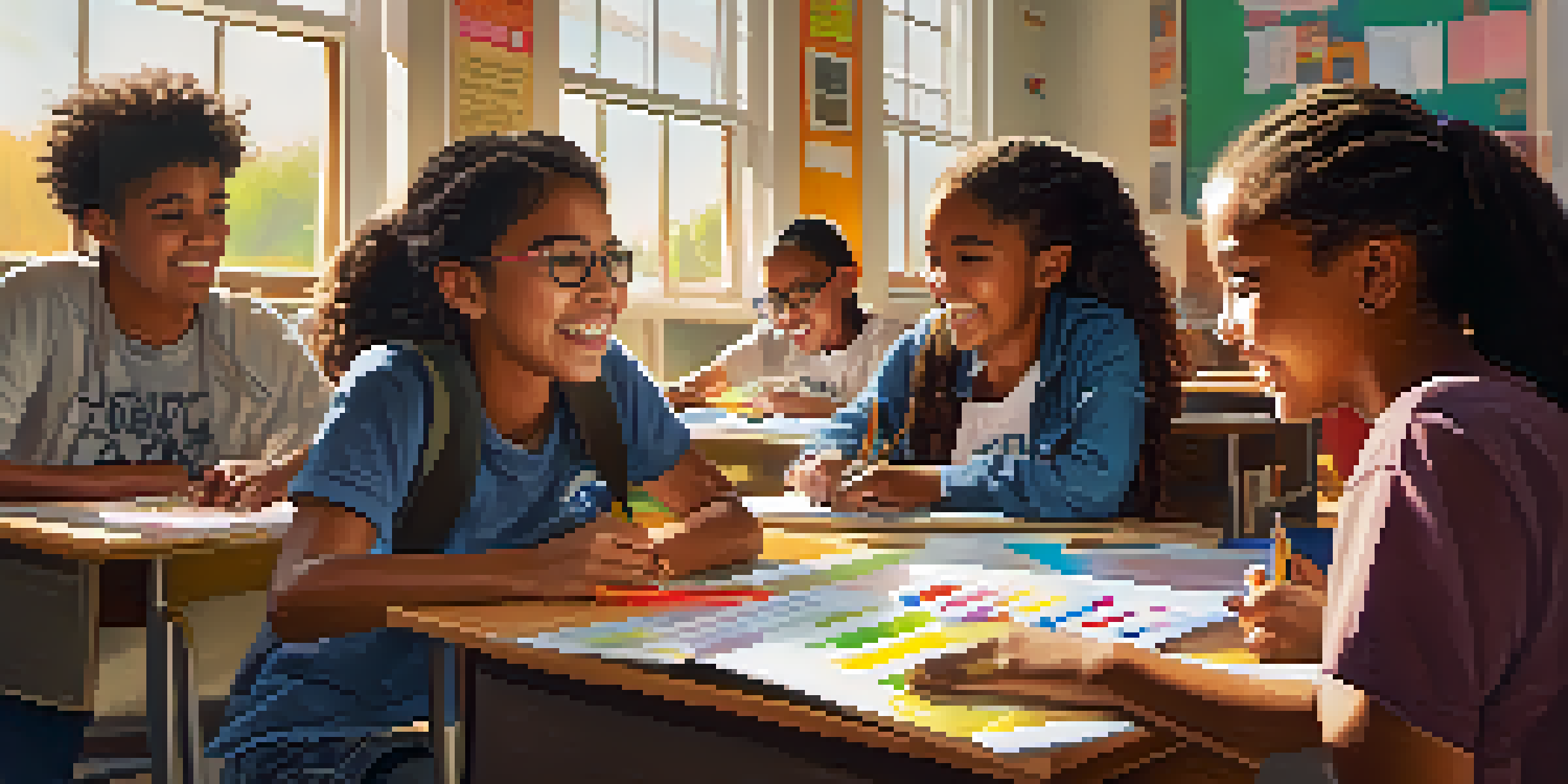The Importance of Trust in Collaborative Educational Environments

Understanding Trust in Educational Collaborations
Trust is the foundation of any successful collaboration, especially in education. It's that invisible thread that connects students, teachers, and parents, creating a sense of safety and mutual respect. When trust is established, individuals feel more comfortable sharing ideas, asking questions, and taking risks in their learning.
Trust is the glue of life. It's the most essential ingredient in effective communication. It's the foundational principle that holds all relationships.
In a classroom where trust flourishes, students are more likely to engage actively. They know their contributions will be valued, fostering an environment where everyone feels heard. This level of openness is crucial for effective collaboration, as it encourages diverse perspectives and innovative solutions.
Moreover, trust encourages accountability among peers. When students trust one another and their educators, they’re more inclined to take responsibility for their actions and support their classmates. This shared sense of accountability leads to a stronger, more cohesive learning community.
The Impact of Trust on Student Engagement
When students trust their teachers and peers, they’re more engaged in the learning process. Trust creates a safe space for exploration and experimentation, which is essential for deep learning. Without this safety net, students may hesitate to participate fully, fearing judgment or failure.

For instance, consider a classroom project where students must collaborate. If they trust one another, they’re more likely to share ideas and take on challenging tasks together. This collaboration not only enhances their learning experience but also builds their confidence.
Trust Boosts Student Engagement
When students trust their teachers and peers, they are more engaged and willing to take risks in their learning.
Additionally, trust can significantly influence motivation. When students feel trusted by their educators, they’re more likely to take ownership of their learning. This intrinsic motivation can lead to improved academic performance and a lifelong love for learning.
Building Trust Among Educators
Trust isn’t just important among students; it’s equally vital among educators. When teachers trust one another, they can share resources, strategies, and feedback openly. This collaborative spirit can lead to professional growth and improved teaching practices.
The greatest ability in business is to get along with others and to influence their actions.
Consider a scenario where teachers regularly collaborate on lesson planning. If they trust each other, they can discuss challenges and brainstorm solutions without fear of criticism. This openness can result in more effective teaching methods that benefit all students.
Moreover, a trusting environment among educators sets a powerful example for students. When students observe their teachers working collaboratively and respectfully, they are more likely to mirror those behaviors in their own interactions.
Trust and Classroom Culture
Creating a culture of trust in the classroom is essential for fostering collaboration. This culture encourages respectful communication and promotes inclusivity, making every student feel valued. A positive classroom culture is one where students can express themselves freely without fear of ridicule.
For example, teachers can establish classroom norms that emphasize respect and support. By modeling trustful behavior, educators can create an atmosphere where students feel safe to share ideas and feedback. This, in turn, cultivates a collaborative spirit among classmates.
Trust Enhances Educator Collaboration
Trust among educators fosters open sharing of resources and strategies, leading to improved teaching practices.
In such an environment, students are more likely to help each other and work together effectively. A strong classroom culture centered on trust transforms the learning experience, making it more enjoyable and productive.
The Role of Trust in Peer Learning
Peer learning relies heavily on trust. Students must feel comfortable learning from one another and sharing their strengths and weaknesses. Trust allows for honest discussions about challenges and successes, creating a supportive learning network.
Imagine a study group where members trust each other. They can freely discuss difficult concepts, share resources, and provide constructive feedback. This collaborative effort not only enhances understanding but also builds relationships that extend beyond the classroom.
Moreover, when students trust their peers, they are more likely to engage in group activities. This engagement fosters teamwork, empathy, and communication skills—essential qualities for success in both academic and real-world settings.
Overcoming Barriers to Trust
Despite its importance, building trust can be challenging in educational settings. Various factors, such as past experiences or differing backgrounds, can create barriers. Recognizing these obstacles is the first step toward fostering a more trusting environment.
For example, students who have faced bullying may find it difficult to trust their peers. Educators can help by implementing team-building activities that encourage collaboration and understanding. These initiatives can break down walls and promote a sense of community.
Trust Forms a Supportive Culture
A culture of trust in the classroom promotes respectful communication and inclusivity, making every student feel valued.
Additionally, consistent communication is key. Educators should encourage open dialogues about trust and its importance. By addressing concerns and being transparent, they can build a more trusting classroom dynamic over time.
Trust as a Lifelong Skill
Trust is not only vital in educational settings but also a crucial life skill. Learning to trust others and being trustworthy oneself can significantly impact personal and professional relationships. Schools play a pivotal role in developing these skills among students.
By fostering a trusting environment, educators equip students with the tools they need to navigate various social situations. This ability to build trust can lead to stronger friendships, better teamwork, and enhanced leadership qualities.

Ultimately, trust is a valuable asset that extends beyond the classroom. As students learn to trust and be trusted, they prepare themselves for future collaborations in their careers and communities, making them not just better students, but better citizens.